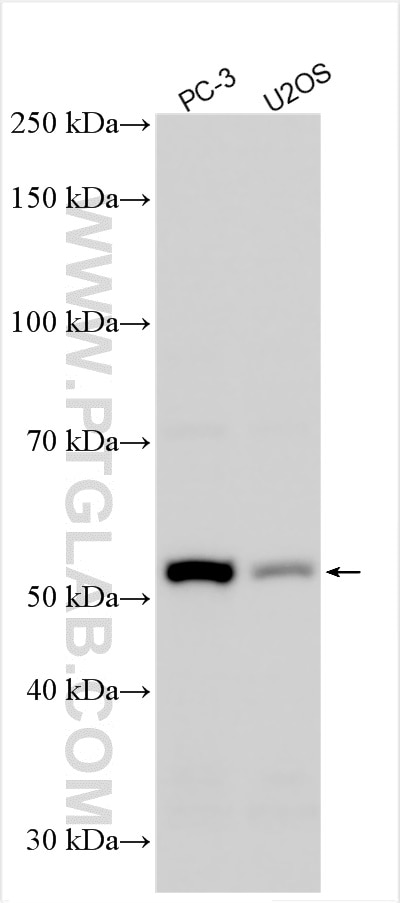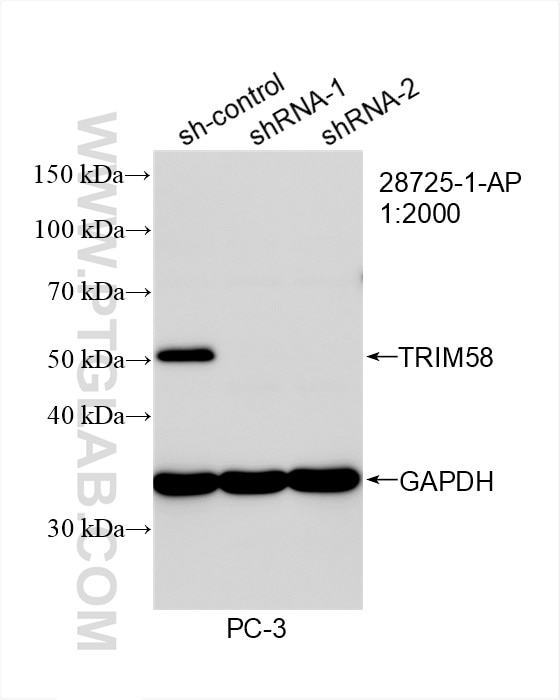Tested Applications
| Positive WB detected in | PC-3 cells, U2OS cells |
Recommended dilution
| Application | Dilution |
|---|---|
| Western Blot (WB) | WB : 1:500-1:2000 |
| It is recommended that this reagent should be titrated in each testing system to obtain optimal results. | |
| Sample-dependent, Check data in validation data gallery. | |
Product Information
28725-1-AP targets TRIM58 in WB, ELISA applications and shows reactivity with human samples.
| Tested Reactivity | human |
| Host / Isotype | Rabbit / IgG |
| Class | Polyclonal |
| Type | Antibody |
| Immunogen |
CatNo: Ag30014 Product name: Recombinant human TRIM58 protein Source: e coli.-derived, PET28a Tag: 6*His Domain: 120-330 aa of NM_015431 Sequence: AGPEHRTHRTAPLQEAAGSYQVKLQMALELMRKELEDALTQEANVGKKTVIWKEKVEMQRQRFRLEFEKHRGFLAQEEQRQLRRLEAEERATLQRLRESKSRLVQQSKALKELADELQERCQRPALGLLEGVRGVLSRSKAVTRLEAENIPMELKTACCIPGRRELLRKFQVDVKLDPATAHPSLLLTADLRSVQDGEPWRDVPNNPERFD Predict reactive species |
| Full Name | tripartite motif-containing 58 |
| Calculated Molecular Weight | 55 kDa |
| Observed Molecular Weight | 55 kDa |
| GenBank Accession Number | NM_015431 |
| Gene Symbol | TRIM58 |
| Gene ID (NCBI) | 25893 |
| RRID | AB_3669668 |
| Conjugate | Unconjugated |
| Form | Liquid |
| Purification Method | Antigen affinity purification |
| UNIPROT ID | Q8NG06 |
| Storage Buffer | PBS with 0.02% sodium azide and 50% glycerol, pH 7.3. |
| Storage Conditions | Store at -20°C. Stable for one year after shipment. Aliquoting is unnecessary for -20oC storage. 20ul sizes contain 0.1% BSA. |
Background Information
TRIM58 (Tripartite motif-containing protein 58) is an E3 ubiquitin ligase induced during late erythropoiesis. It can directly bind and ubiquitinate the intermediate chain of the microtubule motor dynein (DYNC1LI1/DYNC1LI2), stimulating the degradation of the dynein holoprotein complex. May participate in the erythroblast enucleation process through regulation of nuclear polarization (PMID: 25241935).
Protocols
| Product Specific Protocols | |
|---|---|
| WB protocol for TRIM58 antibody 28725-1-AP | Download protocol |
| Standard Protocols | |
|---|---|
| Click here to view our Standard Protocols |






